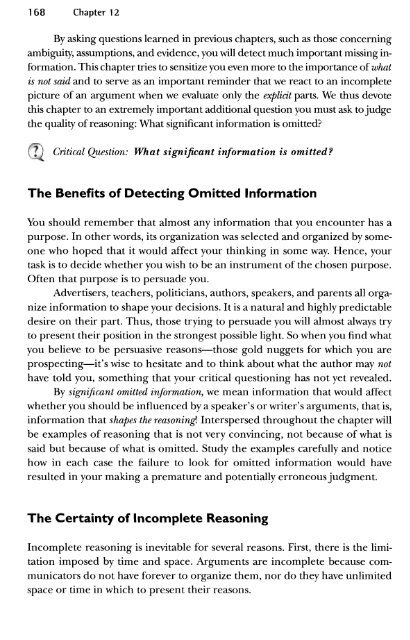Asking the Right Questions, A Guide to Critical Thinking, 8th Ed
Asking the Right Questions, A Guide to Critical Thinking, 8th Ed
Asking the Right Questions, A Guide to Critical Thinking, 8th Ed
Create successful ePaper yourself
Turn your PDF publications into a flip-book with our unique Google optimized e-Paper software.
168 Chapter 12<br />
By asking questions learned in previous chapters, such as those concerning<br />
ambiguity, assumptions, and evidence, you will detect much important missing information.<br />
This chapter tries <strong>to</strong> sensitize you even more <strong>to</strong> <strong>the</strong> importance of what<br />
is not said and <strong>to</strong> serve as an important reminder that we react <strong>to</strong> an incomplete<br />
picture of an argument when we evaluate only <strong>the</strong> explicit parts. We thus devote<br />
this chapter <strong>to</strong> an extremely important additional question you must ask <strong>to</strong> judge<br />
<strong>the</strong> quality of reasoning: What significant information is omitted?<br />
(J)<br />
<strong>Critical</strong> Question: What significant information is omitted?<br />
The Benefits of Detecting Omitted Information<br />
You should remember that almost any information that you encounter has a<br />
purpose. In o<strong>the</strong>r words, its organization was selected and organized by someone<br />
who hoped that it would affect your thinking in some way. Hence, your<br />
task is <strong>to</strong> decide whe<strong>the</strong>r you wish <strong>to</strong> be an instrument of <strong>the</strong> chosen purpose.<br />
Often that purpose is <strong>to</strong> persuade you.<br />
Advertisers, teachers, politicians, authors, speakers, and parents all organize<br />
information <strong>to</strong> shape your decisions. It is a natural and highly predictable<br />
desire on <strong>the</strong>ir part. Thus, those trying <strong>to</strong> persuade you will almost always try<br />
<strong>to</strong> present <strong>the</strong>ir position in <strong>the</strong> strongest possible light. So when you find what<br />
you believe <strong>to</strong> be persuasive reasons—those gold nuggets for which you are<br />
prospecting—it's wise <strong>to</strong> hesitate and <strong>to</strong> think about what <strong>the</strong> author may not<br />
have <strong>to</strong>ld you, something that your critical questioning has not yet revealed.<br />
By significant omitted information, we mean information that would affect<br />
whe<strong>the</strong>r you should be influenced by a speaker's or writer's arguments, that is,<br />
information that shapes <strong>the</strong> reasoning. Interspersed throughout <strong>the</strong> chapter will<br />
be examples of reasoning that is not very convincing, not because of what is<br />
said but because of what is omitted. Study <strong>the</strong> examples carefully and notice<br />
how in each case <strong>the</strong> failure <strong>to</strong> look for omitted information would have<br />
resulted in your making a premature and potentially erroneous judgment.<br />
The Certainty of Incomplete Reasoning<br />
Incomplete reasoning is inevitable for several reasons. First, <strong>the</strong>re is <strong>the</strong> limitation<br />
imposed by time and space. Arguments are incomplete because communica<strong>to</strong>rs<br />
do not have forever <strong>to</strong> organize <strong>the</strong>m, nor do <strong>the</strong>y have unlimited<br />
space or time in which <strong>to</strong> present <strong>the</strong>ir reasons.



